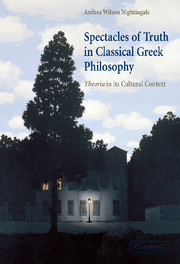Book contents
- Frontmatter
- Contents
- Acknowledgments
- Introduction
- 1 Theoria as a cultural practice
- 2 Inventing philosophic theoria
- 3 The fable of philosophy in Plato's Republic
- 4 Theorizing the beautiful body: from Plato to Philip of Opus
- 5 “Useless” knowledge: Aristotle's rethinking of theoria
- Epilogue: “Broken knowledge”? Theoria and wonder
- List of references
- Index of passages cited
- General index
3 - The fable of philosophy in Plato's Republic
Published online by Cambridge University Press: 22 September 2009
- Frontmatter
- Contents
- Acknowledgments
- Introduction
- 1 Theoria as a cultural practice
- 2 Inventing philosophic theoria
- 3 The fable of philosophy in Plato's Republic
- 4 Theorizing the beautiful body: from Plato to Philip of Opus
- 5 “Useless” knowledge: Aristotle's rethinking of theoria
- Epilogue: “Broken knowledge”? Theoria and wonder
- List of references
- Index of passages cited
- General index
Summary
When you consider the radiance, that it does not withhold/ itself but pours its abundance without selection into every/ nook and cranny not overhung or hidden …
A. R. Ammons, “The City Limits”When one spends too much time travelling, one becomes at last a stranger at home.
Descartes, Discourse on MethodNot till we are completely lost, in other words, not till we have lost the world, do we begin to find ourselves, and realize where we are and the infinite extent of our relations.
Thoreau, WaldenPlato offers a detailed discussion of philosophic theoria in the Republic books v–vii. He locates this discussion in the context of a conversation between quite specific characters, one of whom has dedicated his life to the search for wisdom. As in all his dialogues, Plato places the specificity of the characters in a dialogical relation to the general and abstract ideas under discussion. The drama of the dialogue, in short, corroborates but also complicates the issues set forth in the arguments and myths. This drama features characters in a particular historical context engaging in philosophical discussions on various topics. In the dialogue as a whole, the characters' lives and personalities enrich and illuminate the intellectual arguments. In the Republic and other dialogues dealing with theoria, Socrates' highly idiosyncratic persona affects our interpretation of the text and its account of theorizing.
- Type
- Chapter
- Information
- Spectacles of Truth in Classical Greek PhilosophyTheoria in its Cultural Context, pp. 94 - 138Publisher: Cambridge University PressPrint publication year: 2004

